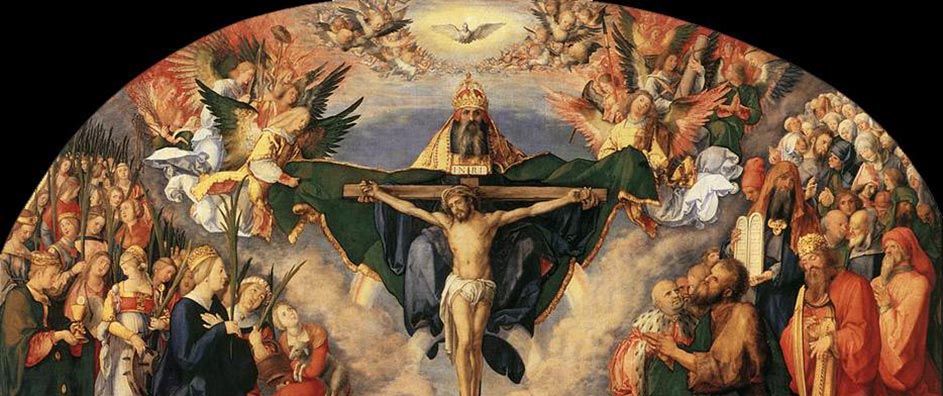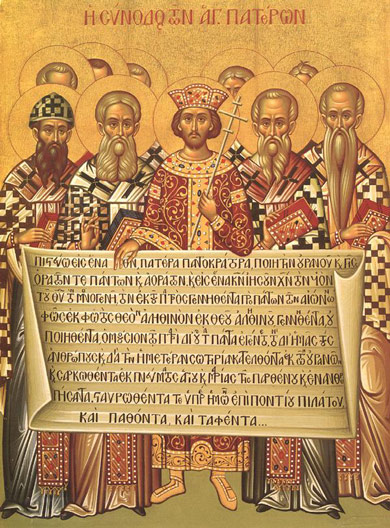The views expressed in our content reflect individual perspectives and do not represent the authoritative views of the Baha'i Faith.
If we want to reconcile the religions – to find a way to mentally and spiritually align their Prophets and purposes – we need to consider the Christian concept of the Trinity.
Most every Christian has been taught to believe in the trinity. I grew up having to confess my belief at every church service. But what does the trinity, the idea of a triune God, mean to Christians? As it turns out, the Trinity means many different things.
Of course, Christ never taught any concept of the Trinity – it came about long after his martyrdom. The trinitarian controversy, born in the third century, rages among Christians to this day. Reflecting back on this theological controversy, the historian Socrates (not the pre-Christian philosopher) wrote: “The situation was exactly like a battle by night, for both parties seemed to be in the dark about the grounds on which they were hurling abuse at each other” (Quoted in Early Christian Doctrines J.N.D. Kelly, Harper and Row, 1978, p. 239). For many, the night remains, because the meaning of the Trinity continues to hide in an awkward frame of words and concepts.
Because the Trinity is such a complex concept, even good and faithful Christians make mistakes and misstatements when they attempt to describe it. Such misstatements, however, have little effect on either the soul or faith of anyone. The trinity is a doctrine, a mental construct that has little to do with salvation.
The evolution of the Christian doctrine of the Trinity proceeded in stages, as many independent scholars and councils operating in different cities debated and reacted against the meaning and distinctions of difficult terms, with the winning doctrine being the one the emperor liked most. The doctrine that first received imperial sanction took concrete form in 325 A.D. at a city in Asia Minor called Nicaea – not far from Constantinople. Nicaea was the site of a conference of bishops called by the Emperor Constantine. Translations differ slightly, but a common version of the Nicene Creed reads:
Emperor Constantine accompanied by the bishops of the First Council of Nicaea
We believe in one God, the Father almighty, maker of all things, visible and invisible;
And in one Lord Jesus Christ, the Son of God, begotten from the Father, God from God, light from light, true God from true God, begotten not made, of one substance with the Father, through Whom all things came into being, things in heaven and things on earth, Who because of us men and because of our salvation came down and became incarnate, becoming man, suffered and rose again on the third day, ascended to the heavens, and will come to judge the living and the dead;
And in the Holy Spirit.
But as for those who say, There was when He was not, and, Before being born He was not, and that He came into existence out of nothing, or who assert that the Son of God is from a different hypostasis or substance, or is created, or is subject to alteration or change these the Catholic church anathematizes.
– Early Christian Doctrines J.N.D. Kelly, Harper and Row, Publishers, 1978. p. 232
The creed specifies as orthodox a belief in one God; one Lord, Jesus Christ; and in the Holy Spirit.
Despite the approval of the Emperor, the Nicene Creed did not end questions about the Christian concept of God. Indeed, the creed merely identified the three elements in the equation of Christian faith: God, Jesus (His Messenger), and the Holy Spirit. The more difficult questions of how the three components are defined and interact were reserved for later creeds and discussions that continue still.
The Baha’i view on this question begins with the broader Baha’i view on religion itself. The Baha’i writings point out repeatedly that religion inevitably changes when human beings attempt to modify it and adapt it to their own liking:
The beginnings of all great religions were pure; but priests, taking possession of the minds of the people, filled them with dogmas and superstitions, so that religion became gradually corrupt. – Abdu’l-Baha, Abdu’l-Baha in London, p. 125.
Let’s take a look at how that process can happen, even to those with the best of intentions.

















Comments
Sign in or create an account
Continue with Googleor